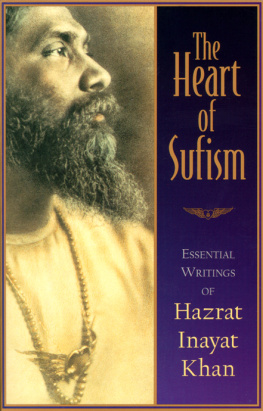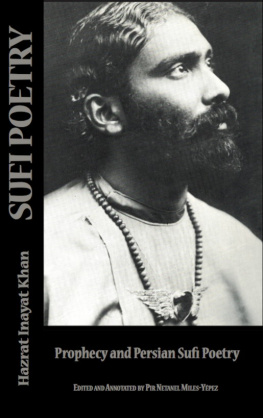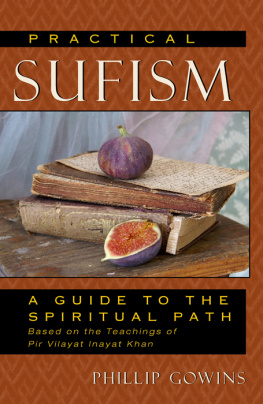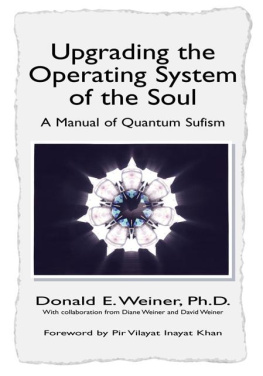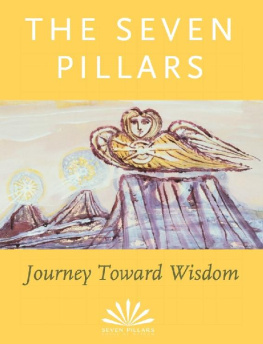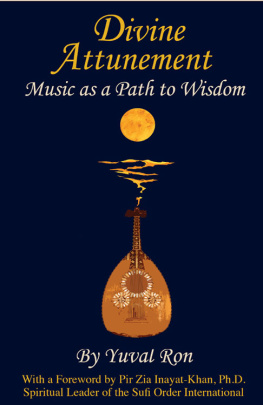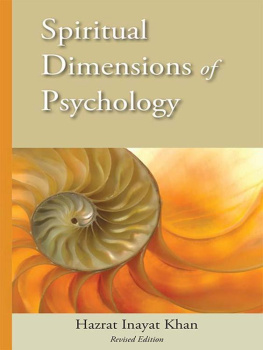Inayat Khan brought one of the strongest and sweetest lineages from India to the West: the music and open heart of Sufism as it blends with Persian poetry and Western intellect. He is a source and a great joy.
Coleman Barks, author of Open Secret and The Essential Rumi
ABOUT THE BOOK
The Indian Sufi master Hazrat Inayat Khan (18821927) was the very first teacher to bring Sufism to the Western world. This is the first representative collection of the masters teachingsmaking it the perfect book for anyone who has been intrigued by his writings but unsure about where to start in his sixteen-volume collected works. Newcomers will be inspired by just how delightful and useful Inayat Khans teachings are for everyone, regardless of religious background. Long-time students will find the book a valuable reference to the essence of his teachings on a variety of subjects. Each chapter includes a wealth of material taken from Inayat Khans work on a particular subject, such as Mysticism, Discipleship, Music, Children, or Divine Intimacy, followed by a selection of his short sayings and aphorisms on the same topic.
HAZRAT INAYAT KHAN was trained as a musician and a Sufi of the Chishti order and gave concert tours of Indian classical music in the United States and Europe.
Sign up to learn more about our books and receive special offers from Shambhala Publications.

Or visit us online to sign up at shambhala.com/eshambhala.
The
HEART
of
SUFISM
ESSENTIAL WRITINGS OF
HAZRAT INAYAT KHAN

Shambhala
Boston & London
2013
Shambhala Publications, Inc.
Horticultural Hall
300 Massachusetts Avenue
Boston, Massachusetts 02115
www.shambhala.com
1999 by The International Headquarters of the Sufi Movement
For information about the International Sufi Movement, founded by Hazrat Inayat Khan, contact:
General Secretariat of the Sufi Movement
Anna Paulownastraat 78
2518 BJ The Hague
The Netherlands
Tel. 070-3461594
Fax 070-3614864
All rights reserved. No part of this book may be reproduced in any form or by any means, electronic or mechanical, including photocopying, recording, or by any information storage and retrieval system, without permission in writing from the publisher.
Library of Congress Cataloging-in-Publication Data
Inayat Khan, 18821927
The heart of Sufism: essential writings of Hazrat Inayat Khan/edited by H. J. Witteveen.1st ed.
p. cm.
Includes bibliographical references and index.
eISBN 978-0-8348-2874-2
ISBN 978-1-57062-402-5 (alk. paper)
1. Sufism. I. Witteveen, H. J. II. Title.
BP189.1472 1998
297.4dc21 98-22128
CIP
The essence of todays message is balance.
HAZRAT INAYAT KHAN

CONTENTS
I n 1910 the prophetic mystic and musician Hazrat Inayat Khan left his native India to bring the Sufi message to the Western world. He faced a daunting task. Sufism was still practically unknown in the West, and Indian classical musichis profession and his only means of providing a livelihoodwas also new and, as he expressed it himself in his autobiography, was put to a hard test in a foreign land, where it was as the old coins brought to a currency bank.
But to overcome the material difficulty of his task, he came with great spiritual power. He was prepared perfectly for his task. In his music he had reached the highest proficiency and inspiration. And after going deeply into meditation, meeting many of the holy men of India from all religions, and receiving the blessing of initiation and discipleship, he could instantly rise to the state of samadhienlightenment. This worked through in his music, in which he lifted his audience above the spheres of the earth.
His spiritual teacher said to him: Fare forth into the world, my child, and harmonize the East and West with the
And when he wondered on the ship bound for New York how his life and work would develop there, he heard the voice from within, saying, Thou art sent on Our service, and it is We Who will make thy way clear. That was his consolation, his faith, and his inner strength.
After some time of preparation, studying the psychology of people in the West, and making contacts, his Sufi message began to unfold. When one surveys his teachings now, one is struck by their extraordinary richness and comprehensiveness. In innumerable lectures and talks given all over America and Europe in little more than fifteen years, his inspired teachings enlightened all aspects of human life with simplicity and clarity and yet with the greatest depth.
Is it possible to give an overview of these wide-ranging teachings in an anthology? It is not easy; but it seems very meaningful, and I think it can be done. Many students and seekers for truth may need such an overview. And the character of the teachings, all given orally to very different audiences, also means that a selection from them can be valuable. In speaking, Hazrat Inayat Khan often had to attune and prepare his audience slowly, building up his explanation to come to the inspired teachings that form the essence of the Sufi message. This anthology attempts to bring the most important of these teachings together, sometimes in complete chapters from his published works and sometimes in selections of certain striking passages. But of course the choice remains difficult. The richness of Inayat Khans universal Sufi message is so great that it cannot be captured within one volume. And in addition to the published work that is the basis for this anthology, there are Inayat Khans deeper esoteric teachings, specially meant for the disciples of the Inner School of the Sufi Movement, which have not yet been published. But this anthology should at least give an overview and offer such inspiring teachings that students may be motivated to go further by studying the Sufi Message volumes themselves. The teachings seem clear and simple; but to really grasp and assimilate them, the attunement and expansion given in the complete teachings is needed. And these teachings show so many further facets of this diamond of wisdom.
With all its variety of subject matter, the Sufi Message is still completely unified, because all these subjects are considered from the mystical point of view of the one divine spirit, penetrating all life, the whole creation. From every angle Hazrat Inayat Khans explanations open a window to God and the unity of life. In this way the Sufi Message can offer what the great scientist David Bohm saw as the need to restore a coherent culture, a way of thinking and perceiving which brings everything together.
The choice of subjects in this anthology can be seen in this light. The first chapter gives a few characteristics of Sufism. It starts with an evocation of what Sufism is and of the meaning of Sufi poetry; and especially of the great Persian Sufi Jelaluddin Rumi, who now attracts so many admirers. Then some important aspects of human life are explained: how to find real happiness in becoming conscious of the divine, of love, harmony, and beauty, which are so central in Sufism; the path of attainment that we have to follow in life until our interests are satisfied and we can turn to the inner life, the path to God, with indifference to outer things. Through all this a balance is needed. Inayat Khan has said, The essence of todays message is balance.
After this introductory chapter, the next part gives the religious aspect. This is rather fully covered. The important concept of the God ideal is developed: mans evolving image of God, which can carry him gradually closer to Gods reality. That reality is seen in Inayat Khans mystical philosophy as the all-pervading spirit of which the Bible says: In Him we live and move and have our being. That brings us next to metaphysics: the voyage of the soul, coming from the divine source, through the worlds of the angels and of the spirits (
Next page
